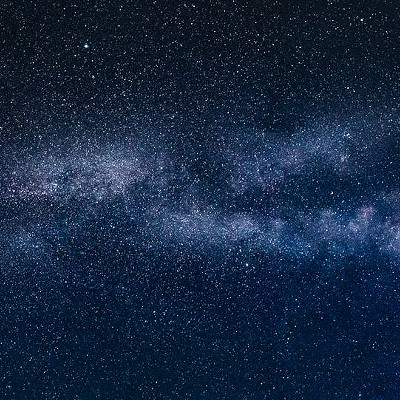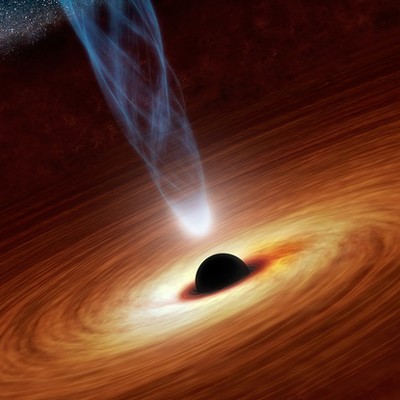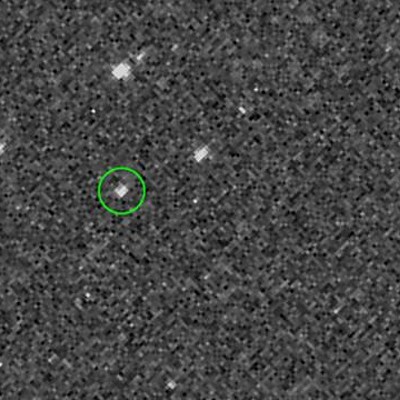Astronomers used to think that at some point down the road, our expanding universe would possibly grind to a halt due to gravity's possessive ways, and undergo a colossal cave-in, crushing all matter like a cosmic trash compactor.
These days, there aren't quite as many proponents of the Big Crunch hypothesis, because it appears the universe does not have enough matter to trigger such a collapse.
However, in How It Ends: From You to the Universe, UA astronomy professor Chris Impey tells us that while the universe may dodge gravity's bullet, its eons are definitely numbered. Dark energy, he says, may be the force that will eventually do it in.
According to Impey, dark energy, while still largely theoretical, appears to be an elemental component of space that began flexing its muscles about 5 billion years ago. Scientists believe dark energy makes up about three-quarters of the universe and behaves like anti-gravity, speeding up the universe's expansion. It also seems to increase in volume and might as space expands—and in roughly 20 billion years, it may gather enough power to completely decimate the universe, shredding matter and ripping apart everything from galaxies to atoms.
Impey writes that we don't have enough information to know for sure what kind of eschatological mischief dark energy will get into. It's just as likely, he says, that Armageddon will be a much-less rambunctious affair—thanks to good old-fashioned entropy.
"In a time," Impey writes, "that's as long compared to a trillion years as a trillion years is to a billion billionth of a second ... protons have decayed, stars have dissipated, and black holes have evaporated ... (and) our patch of the accelerating universe has disintegrated under cover of darkness into a uniform soup of particles and photons."
These bleak scenarios conclude a book of endings that bear witness to the existential fact that nothing lasts forever. Of course, that doesn't sound like very cheerful reading, but for a book so steeped in death and cosmic annihilation, How It Ends is remarkably upbeat, and imbued with wit, wisdom and a palpable sense of awe over our universe.
Impey writes that rather than being just a reservoir of facts, science is actually an extended web of stories that helps us bring organization and coherence to our existence. All stories, he notes, require endings, even if, as is the case with certain scientific narratives, some of them are speculative.
"Scientists," he writes, "steer toward the boundary between what they know and what they don't know because that's where the excitement is."
There's certainly an ample supply of exciting and delightfully eclectic stories in this volume. (It's doubtful that you'll ever again encounter a book that discusses both the multiverse—string theory's hypothetical, poly-dimensional universe—and Cheeta, or a chimp purported to be Cheeta, Johnny Weismuller's simian co-star, who now lives in Palm Springs, painting and watching movies.) In fact, this book is so densely packed with data that readers may feel as if they've perused several texts.
I came away with my brain absolutely fizzing over such diverse and fascinating topics as Milkomeda, a teeming mosh pit of stars assembled from the projected merger of the Andromeda galaxy and the Milky Way; Gaia, James Lovelock's living-earth hypothesis; the shadow biosphere, a theory which suggests that Earth may be inhabited by life forms so far removed from our present definitions of life as to be unrecognizable; and terraforming, the extraordinarily complex operation of turning a dead planet such as Mars into a habitable human refuge.
Of course, terraforming and other plans to colonize the cosmos are motivated not only by mankind's curiosity and sense of adventure, but also by its implacable survival instinct. Impey investigates some of the more earthbound manifestations of this impulse, including cryonics, the slightly creepy process of freezing the dead in hopes that science can someday resurrect them, and transhumanism, a movement advocating using technology to turn people into quasi-machines, "as if you'd been merged with your fantasy sports car."
Impey writes that consciousness is both a curse and a blessing. The always-lurking awareness of our inevitable demise is, for many of us, an unending source of dismay. However, from Impey's point of view, curtain calls pale in significance when compared to our remarkable road trip through life.
"In this universe full of magical moments," he says, "it doesn't matter what happens in the end."










